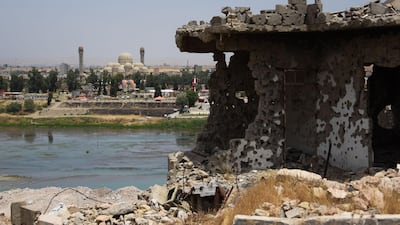Ahmed Hamed has dreamt of rebuilding his pulverised home in Iraq's Mosul from the moment government forces recaptured the northern city from ISIS in 2017. But three years on, it remains a pile of rubble.
He is among tens of thousands of Iraqis who have filed claims to the Nineveh province's Subcommittee for Compensation, seeking reparations for material goods, injuries and even lives lost in the months-long fight to retake Mosul from the extremist militants.
"I still haven't gotten a cent, even though it's been so long since the liberation," said Mr Hamed, 25, who works menial day jobs to afford a small apartment.
His original home lies in Mosul's ravaged western half, where ISIS made its final stand in the city and where reconstruction has been the slowest.
Iraq gathered $30 billion (Dh110bn) in pledges from international donors in Kuwait in 2018 to rebuild, but virtually none of the funds have been disbursed.
The lack of progress has been widely blamed on Iraq's infamous bureaucracy, corruption that has siphoned off reconstruction funds and polarised city politics.
Amid the coronavirus pandemic and plummeting oil prices, Iraq's government is struggling to rake in enough monthly revenues to break even – pushing rebuilding even lower on its priorities list.
"Politicians keep telling us we need to go home," Mr Hamed said, slamming the government's insistence on closing down the camps where more than one million Iraqis, rendered homeless by the fighting, are still taking shelter.
"But how? Our homes are destroyed and there isn't a single public service that works."
According to a Norwegian Refugee Council survey in Mosul, more than 270,000 people remain unable to return home and of those living there, 64 per cent said they would be unable to pay rent in the next three months.
Every day, dozens of people queue outside a reception window at the Subcommittee for Compensation, clutching thick packets of multi-coloured forms they pray will be approved by the central committee in Baghdad.
Among them under the midsummer sun was Ali Elias, 65, who was hoping for news of his son, a soldier kidnapped by ISIS in 2017.
"I filed a claim on him shortly after the liberation, at least so we know what happened to him. It was sent to Baghdad, but no one answered," he said.
"I'm getting old and I'm exhausted by spending my life in these different government offices."
According to subcommittee head Mohammed Mahmoud, the body has received "90,000 claims, of which about 48,000 to 49,000 were for goods, houses, shops and other properties, and 39,000 for human loss – dead, wounded or missing".
"We processed three-fourths of the claims on material damage, but there aren't enough funds to actually pay them out. We were only able to compensate 2,500 families," he said.
Friday marked exactly three years since the Iraqi government declared victory over ISIS in Mosul on July 10, 2017. In one of their final acts, the militants blew up the Al Nuri mosque and its famous leaning minaret, which are now being restored with UAE assistance.
Most of the rebuilding efforts in the city have either been undertaken by individuals or by the United Nations and other international organisations.
The UN has reconstructed 2,000 homes, dozens of schools, healthcare centres, and water or power plants in Mosul since 2018, but even it has faced challenges.
According to a recent report by the American University of Iraq in Sulaimaniyah, the UN Development Programme (UNDP) complained the "government is stalling or blocking projects rather than facilitating them".
Seeking to root out corruption, the UN introduced long vetting processes, which further delayed rebuilding.
The report accused ex-Mosul governor Nawfal Aqoub of seeking bribes and kickbacks from reconstruction companies.
Even when a project was completed, authorities often failed to hire staff, wrote its authors Zmkan Ali Saleem and Mac Skelton.
The scandalous testimonies found an audience in Iraqi Prime Minister Mustafa Al Kadhimi, who travelled to Mosul in June and promised things would change.
"I want to personally look at every contract for Mosul's reconstruction, so that we no longer see a single case of exploitation or corruption," said Mr Al Kadhimi, who took office in May.
But the outlook remains grim.
Already, the housing and migration ministries were two of the worst-funded, making up 2 per cent and 0.1 per cent of cabinet's 2019 budget, respectively.
They were the only two ministries whose salary expenses shrank that year.
"Baghdad has done too little in response to this catastrophe," said Muzaham Al Khayyat, who briefly governed the city when Mr Aqoub was ousted.
Now, with the government facing a liquidity crisis, authorities are scraping together funds each month to pay eight million workers, pensioners and welfare recipients.
Barely breaking even, they appear unwilling to grow costs further by funding compensation or reconstruction.
"We asked the finance minister to set aside up to 20 billion dinars [Dh61.6m] for compensation in Nineveh, but he hasn't approved our request," said lawmaker Mahasen Hamdoun, who hails from the province.
"Kadhimi promised a lot during his visit, but nothing was done."









